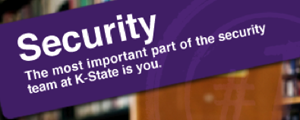 Thus far in 2010, 292 K-Staters have been duped by spear-phishing scam e-mails and given away their eID password to criminals who then use the stolen information to sign in to webmail and send thousands of spam messages. Sadly, we’re on pace to break last year’s record of 431 K-Staters who gave away their passwords in this way.
Thus far in 2010, 292 K-Staters have been duped by spear-phishing scam e-mails and given away their eID password to criminals who then use the stolen information to sign in to webmail and send thousands of spam messages. Sadly, we’re on pace to break last year’s record of 431 K-Staters who gave away their passwords in this way.
Obviously, the first thing on this semester’s top-six security list must be:
- Never give your password to anyone in an e-mail message! K-State was plagued by nearly 300 instances of phishing scams in 2009 (and 260 thus far in 2010!) that try to trick people into replying with their eID password. The hackers responsible for these scams are relentless! If you remember this one simple rule, you can prevent becoming a victim: K-State IT support staff will never ask for your password in an e-mail, nor will any legitimate business or organization. If you get such an e-mail, just delete it. The same holds if you get an email with a link to a web form that asks you to fill in your username and password – don’t do it!
- Learn to recognize scams, frauds, and other forms of malicious communications so you don’t become a victim of identity theft, financial fraud, or end up with a compromised computer. Criminals are using all kinds of new tricks and coming at you from all angles — e-mail, social networking sites like Facebook and Twitter, malicious links on webpages, Instant Messaging, phone calls, and even knocking on your door. As an example, last year more than 230 K-Staters were tricked into opening malicious e-mail attachments, resulting in 230+ compromised computers. Be informed and think before you click! Continue reading “Six things you need to know about IT security at K-State”